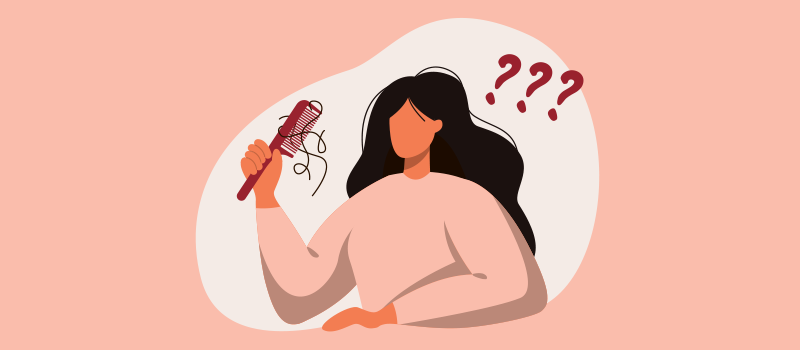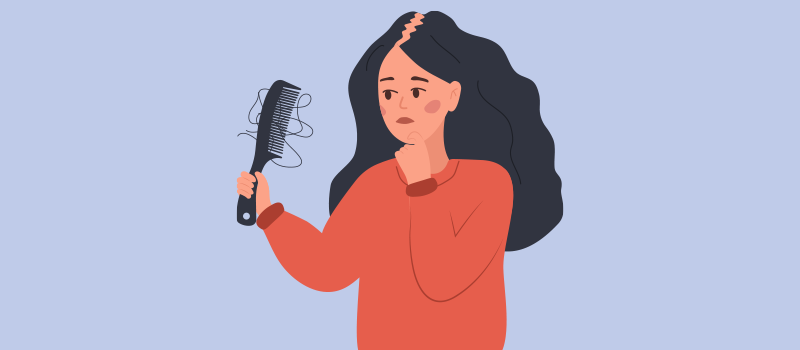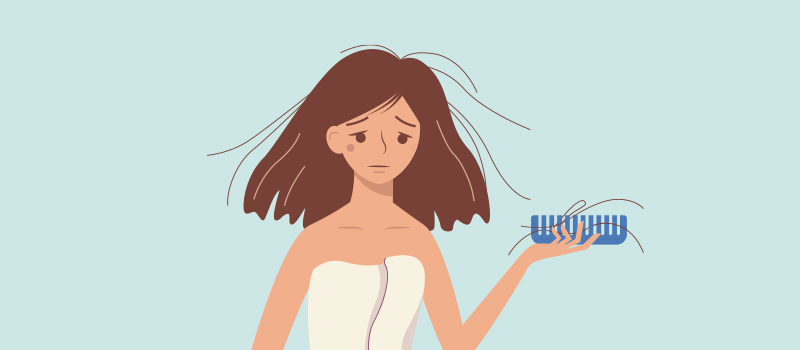What’s the Buzz
The Bee Healthy Blog
Reasons for Hairloss: Is Your Medication the Culprit?

The average human head has around 100,000 hairs. It is normal for roughly 50-100 strands to fall out every day. Some people, however, experience hair loss at a much higher rate, leading to thinning hair and baldness, which can be quite demoralizing for both men and women.
Various things can lead to hair loss, ranging from over-styling with heating tools and hair products to genetics, pregnancy, medical conditions, and even certain medications. If you are seeing way too many strands of hair fall out, you may be interested in what could be causing hair loss and what you can do about it.
What causes hair loss?
The most common cause of hair loss is female or male-pattern baldness. This is caused by a combination of genes and sex hormones. However, there are many other things that can also lead to hair loss, including:
- Mental stress
- An unbalanced diet lacking sufficient protein and other minerals
- Hormonal changes (such as the use of oral contraceptives, pregnancy, or menopause)
- Sudden weight loss
- Certain medical conditions
- Certain medications
- Genetics (family history of hair loss)
- Sun damage
- Over-styling hair with chemicals or heating tools
What medical conditions can cause hair loss?
Some medical conditions affect the hair follicles leading to reduced hair growth or increased hair loss. Common conditions that can cause excessive hair shedding and thinning include iron deficiency anemia, polycystic ovarian syndrome, over-supplementation with vitamin A, overactive or underactive thyroid, lupus, and alopecia areata (an autoimmune condition in which the immune system attacks skin and hair cells, leading to patchy hair loss).
The good news is that hair loss caused by many of these medical conditions is temporary. In these cases, the damage is reversible, and the improvement takes place once the medical conditions are being treated.
Which drugs can make your hair fall out?
Certain medications can cause hair loss as a side effect. This is known as drug-induced alopecia. Apart from chemotherapy drugs which are known for their hair loss side effects, other medications that can also cause hair loss are:
- Anticoagulants or blood thinners
- Medications used to treat high blood pressure, including beta-blockers and ACE inhibitors (Angiotensin-converting enzyme inhibitors)
- Gout medications
- Vitamin A in large doses
- Birth control pills
- Male hormones (anabolic steroids, testosterone)
- Antidepressants
- Nonsteroidal anti-inflammatory drugs (NSAIDs)
- Drugs that suppress the immune system
The severity of drug-induced hair loss depends on the medication and the duration of treatment. If you are experiencing this type of hair loss as a side effect of your medication, please do not hesitate to discuss your concern with your doctor. Modifying doses or choosing an alternative drug option may be beneficial in reversing hair loss that occurs due to certain medications.
What is anagen effluvium and telogen effluvium?
The hair growth cycle includes an anagen phase and a telogen phase. During the anagen phase, which lasts anywhere from two to seven years, hair growth occurs. During the telogen phase, which lasts three to four months, the hair follicles rest.
Medications can cause two types of hair loss--anagen effluvium and telogen effluvium. Anagen effluvium occurs when the hairs are actively growing. This type of hair loss occurs within a few days to weeks of taking the drug. Anagen effluvium is commonly seen with chemotherapy drugs because they damage the hair matrix cells responsible for producing new hairs.
Telogen effluvium is the more common type of drug-induced hair loss. It occurs two to four months after starting a medication and affects the entire scalp. Treatment with blood thinners, beta-blockers, ACE inhibitors, gout medication, and antidepressants can cause this type of hair loss.
What are the signs of drug-induced alopecia?
One of the earliest signs of drug-induced hair loss is noticing an increased number of hairs in your hairbrush, on your pillow, or in the shower drain. Also, the timeline is often a telltale sign. Many people notice increased hair loss shortly after starting a new medication. The hair loss affects the whole scalp but is often more noticeable at the top of the scalp.
Can hair loss be a sign of something serious?
Hair loss may indeed be a sign of an underlying health condition such as lupus, thyroid disorders, or iron deficiency. It is essential to be examined by a healthcare provider if you are experiencing increased hair fall. Your doctor will be able to determine the root cause of your hair loss and guide you toward appropriate approaches for treatment and prevention.
How can I stop my hair from falling out due to medication?
The simplest way to treat drug-induced hair loss is to stop taking the medication that is the aggravating factor. New hair growth usually starts within 3-6 months of stopping a drug, but it can take a year or more for the scalp to fill out and recover fully from the side effects of medication. However, it is extremely important that you consult with your doctor prior to discontinuing your medication. Hair loss is a very unpleasant experience that can have a negative impact on your personal and social life, though, keep in mind that your doctor can offer alternative therapy so that your existing medical condition does not go untreated.
What can I do to encourage hair growth?
Maintaining a healthful lifestyle is essential to promote hair growth. Consuming a healthy, protein-rich diet is recommended; however, if you have a history of kidney disease, please discuss with your doctor your protein intake before making changes to your diet. Regular exercise and good stress management are also helpful in promoting hair growth. In addition to diet and exercise, limiting excessive use of styling tools and harmful hair chemicals plays a major role in reducing hair and scalp damage.
If your hair loss is due to male or female pattern baldness, medications such as finasteride (Propecia) or minoxidil (Rogaine) have been proven to be effective in slowing and reversing hair loss. Talk to your primary care doctor or a dermatologist if you are experiencing hair loss. Lab works, along with physical examination can determine the root causes and provide guidance on appropriate treatment approaches.
References:









SOCIAL